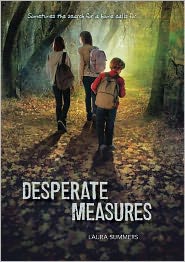 Summers, Laura. (2011). Desperate measures. New York: Putnam. Life hasn't been easy for twins Vicky and Rhianna, 13, and their younger brother Jamie. Their mother's death and their father's disappearance for long periods of time left the siblings to fend for themselves. Their foster family has had to give them up because of the mother's life-threatening pregnancy, and they decide to head toward their elderly great-aunt's home rather than being separated in foster care. The story alternates from the point of view of Vicky and Rhianna, providing readers with unique perspectives on the events in the story. While Vicky is serious and concerned about the consequences of their actions while also being worried about her brother and sister, Rhianna is more concerned with current conditions, such as how tired or hungry she is, and she resents being bossed by her sister. Clearly, all three youngsters have been affected by the many life-altering events that have occurred recently, and Jamie is prone to bouts of outbursts and impulsive behavior. The journey on which they embark is his idea. But as often happens, their plans do not go as expected, and once they reach their destination, someone else is living in their relative's home. Naturally, they find allies along the way as well as others who seem to bent on cruelty just for the sake of cruelty. It is particularly interesting that they left bullies behind in the schools they attended, and they have brief encounters with bullies in the countryside to which they flee. The author makes it clear that bullies can find the most unlikely reasons to tease others; in the case of Rhianna, it is her learning disability that makes her seem different; in the case of Daniel, the boy who befriends the children, it is his reluctance to fight back or respond to teasing. The book offers readers much to consider regarding human behaviors such as bullying and stealing and also examines what comes after death. Ultimately hopeful, this book allows all of its main characters to grow in subtle ways. Rhianna especially touches the heart with her refusal to believe what she is told about death; instead, she interprets the afterlife in her own fashion.
Summers, Laura. (2011). Desperate measures. New York: Putnam. Life hasn't been easy for twins Vicky and Rhianna, 13, and their younger brother Jamie. Their mother's death and their father's disappearance for long periods of time left the siblings to fend for themselves. Their foster family has had to give them up because of the mother's life-threatening pregnancy, and they decide to head toward their elderly great-aunt's home rather than being separated in foster care. The story alternates from the point of view of Vicky and Rhianna, providing readers with unique perspectives on the events in the story. While Vicky is serious and concerned about the consequences of their actions while also being worried about her brother and sister, Rhianna is more concerned with current conditions, such as how tired or hungry she is, and she resents being bossed by her sister. Clearly, all three youngsters have been affected by the many life-altering events that have occurred recently, and Jamie is prone to bouts of outbursts and impulsive behavior. The journey on which they embark is his idea. But as often happens, their plans do not go as expected, and once they reach their destination, someone else is living in their relative's home. Naturally, they find allies along the way as well as others who seem to bent on cruelty just for the sake of cruelty. It is particularly interesting that they left bullies behind in the schools they attended, and they have brief encounters with bullies in the countryside to which they flee. The author makes it clear that bullies can find the most unlikely reasons to tease others; in the case of Rhianna, it is her learning disability that makes her seem different; in the case of Daniel, the boy who befriends the children, it is his reluctance to fight back or respond to teasing. The book offers readers much to consider regarding human behaviors such as bullying and stealing and also examines what comes after death. Ultimately hopeful, this book allows all of its main characters to grow in subtle ways. Rhianna especially touches the heart with her refusal to believe what she is told about death; instead, she interprets the afterlife in her own fashion.Favorite Lines:
“I tried to conjure up her face in my mind’s eye, but it was as if some invisible force was rubbing out the details as fast as I tried to remember them. Shocked, I concentrated harder, but all I could see was the vague shape of someone wrapped in warm blankets and huddled in a deck chair” (p. 132).
“All the anger that had been stored up in me for the last two years suddenly ebbed away like the tide on a beach” (p. 207).
No comments:
Post a Comment